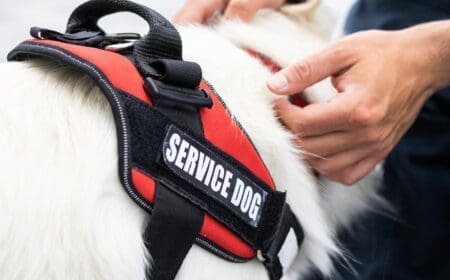Emotional support animals have the power to help people with mental disabilities. These powerful companions can help you remain calm in public, reduce general stress, and help with mental health conditions like PTSD, depression, and anxiety.
That said, there’s more to emotional support animals (ESAs) than meets the eye. While ESAs have some unique benefits, they’re not the same as service dogs. So, what are the laws about ESAs in Texas?
If you want to know about the emotional support animal laws in Texas, we have you covered. In our guide, we’ll cover what an emotional support animal is, ESA laws in Texas, and how to get an ESA letter.
What Is an Emotional Support Animal in Texas?
Emotional support animals are there to provide comfort and support for their owners. In most cases, an ESA keeps their owner calm in stressful situations and alleviates the symptoms of certain mental health conditions.
It’s also important to note that emotional support animals are not designated as “pets” according to Texas law. Instead, they’re considered to be assistance animals. Unlike service animals, your ESA can be any kind of animal, such as a cat, dog, or rabbit, and they do not need to be trained.
We give you more of an overview of the differences between service animals and ESAs below.
What’s the Difference Between ESAs and Service Dogs?
Emotional support animals and service dogs are not the same thing.
Service dogs, for example, must train for several years to perform a specific task for their owner, and this training usually costs $20,000 to $30,000. Training involves the dog learning how to perform disability-related tasks for their owners, and it’s no surprise that these necessary companions have different rights than ESAs.
Service animals have fairly wide-reaching public access rights, and they can accompany their owner virtually anywhere. Both federal and state-level laws protect this.
On the other hand, emotional support animals only have protected housing rights, something that allows the animal to stay with their owner in any reasonable area of housing. This right is essential for individuals who do not need daily assistance with tasks but who benefit from the comfort, support, and routine of owning their ESA.
Who Qualifies for an ESA in Texas?
Individuals with mental health conditions or disabilities in Texas can qualify for an ESA, with the approval of a licensed mental healthcare provider. In general, individuals who do not need the consistent and advanced assistance of a service animal but would still benefit from companionship can qualify for an ESA.
The best way to determine if an ESA is right for you is to think about your needs and how an emotional support animal might impact your life and your disability or mental health condition. Speak to your provider for help determining if this is the right thing for you.
Do Landlords in Texas Have to Allow Emotional Support Animals?
In most cases, landlords must allow emotional support animals in Texas. According to the Fair Housing Act (FHA), it’s against federal law to discriminate against a tenant because of a disability. Therefore, with an ESA letter, you can live in a home that is otherwise not pet-friendly.
That said, there are some exceptions. The biggest exception is that if your emotional support animal cannot be properly cared for in your chosen housing unit or causes harm to people or property, the landlord can revoke your ESA accommodations.
What Are the Requirements for an Emotional Support Animal?
The requirements for an emotional support animal are simple enough. First and foremost, you must have some type of mental health disability that warrants an emotional support animal. Some quick examples include things like depression, anxiety, and bipolar disorder.
Aside from having a disability, you also have to seek out treatment. Therefore, you must consult with a licensed mental health professional and have them approve an ESA letter. The letter is what allows you to live in housing with your ESA.
Emotional Support Animal Laws in Texas
Both federal and state-level laws apply to emotional support animals in Texas. The most common federal laws include the Fair Housing Act and the Americans with Disabilities Act (ADA). Most of Texas’s state laws uphold these federal acts.
Travel Laws for Emotional Support Animals in Texas
The Air Carrier Access Act (ACAA) provides laws for traveling on airlines with a service animal or emotional support animal. Under this act, service animals can travel free of charge in the cabin with their owner.
The law previously included ESAs, but changes were made in 2020 that no longer protect ESAs. Instead, individuals wishing to travel with an ESA must adhere to all pet restrictions for their animal, including registering their pet with the airline and paying pet fees.
Additionally, the ADA states that service animals can accompany their owners onto public transportation in Texas. Emotional support animals are not protected by this law, and you can only take your ESA onto public transportation in Texas if the bus, train, car, or other transit is pet-friendly.
You can always contact certain public transportation operators in your area and inquire about exceptions for your ESA, but these exceptions are not legally required.
Employment Laws for Emotional Support Animals in Texas
Employment is an essential part of life for millions of people in Texas and across the United States. Under the ADA, employers cannot discriminate against employees due to a disability, and this allows individuals to bring their service animals to the workplace with them. Accommodations must be made for individuals requiring service animal assistance in Texas.
However, emotional support animals are not considered service animals, and your employer is not legally required to allow you to bring your ESA to the workplace. You may be able to request accommodation anyway, depending on your employer’s policies.
In workplaces where it is safe to have a well-behaved and calm ESA, you might get special permission to bring your companion animal. Be sure to fill out any forms required by your workplace to make this accommodation, and be prepared to submit a copy of your ESA letter.
Public Access Laws for Emotional Support Animals in Texas
Texas follows the ADA when it comes to public access rights for service dogs. Some places that are considered public access in Texas include the following:
- Parks
- Museums
- Stadiums
- Concert venues
- Restaurants
- Businesses
- Stores
Service animals can accompany their owners into any public or private location, with a few limited exceptions. Emotional support animals, unfortunately, do not have these rights, and your ESA can only accompany you into areas that are pet-friendly.
You may need to check ahead with businesses and restaurants to determine if policies allow you to bring your well-behaved ESA into the space with you.
Housing Laws for Emotional Support Animals in Texas
Texas state laws are in line with the federal Fair Housing Act when it comes to housing rights for your ESA. The FHA ensures that landlords cannot discriminate against individuals who may need to live with their emotional support animal or service animal as part of the treatment plan for their condition or disability.
The FHA states that ESA handlers can always live with their ESA, even if there’s a ‘no pets’ policy in place. ESAs are exempt from weight and breed restrictions, and landlords cannot charge ESAs any pet fees or pet rent.
While landlords in Texas must follow laws outlined by the FHA, the behavior of your ESA is also important to consider. If your ESA is unfriendly or damages property, landlords may be able to legally deny your ESA accommodations, and you will be forced to adhere to all pet rules and restrictions in your chosen housing unit.
How to Get an Emotional Support Animal Letter in Texas
An emotional support animal letter is what allows you to take advantage of the legal housing protections for ESAs. You will need to get your ESA letter prescribed to you by a licensed mental healthcare provider in the state. We discuss this process more below.
Think About Your Support Animal Needs
If you are considering adding an emotional support animal to your life, it’s important to take into account your needs.
Consider your mental health condition or disability, and take time to speak with family members, therapists, and doctors. It’s important that you can financially, physically, and mentally care for any animal you adopt, even if the animal is meant to be your support companion.
If you already have a pet, you may be able to transition them into being your ESA with the permission of your mental healthcare provider. If you don’t have a pet, you should think about the type of animal you’d love to care for and which can bring you the most benefits.
Keep in mind that if you need an animal to directly perform tasks for you that are related to your disability, such as retrieving medications or opening doors, you likely need a service dog instead of an ESA. Speak to your provider to further evaluate your needs.
Speak With a Licensed Mental Health Professional
The next step in obtaining a valid ESA letter is speaking with a licensed mental health professional on the phone or visiting their office. Texas state law requires that you receive your letter from a mental healthcare professional or medical provider licensed in the state.
If you don’t have a mental healthcare professional to go to and you live in Texas (or are thinking about moving there), you can fill out our ESA consultation form. From there, we’ll let you know whether you’re qualified for an ESA.
At your appointment, your provider will ask you about your background, the medications you take, and some medical history. From there, they may ask you about your mental health condition or disability. The goal is to identify if you have a condition that warrants an ESA and how an ESA might help you.
Wait for Your Texas ESA Letter
The last part of the process is to wait for your ESA letter. ESA letters can come as soon as one day, or it may take a few days for a licensed mental health professional to approve your letter, write it, and deliver it to you. Speak to your provider if you have any concerns about the timeline for this process.
Get an Emotional Support Animal in Texas Today
Emotional support animals can change your life. If you’re someone who struggles with mental health issues, ESAs can help you treat them. That said, always make sure you go about getting an ESA letter the proper way to avoid fines, and never call your ESA a service dog to get around Texas laws. Doing so results in hefty fines that can be hundreds of dollars.
The good news is that getting an ESA letter in Texas isn’t challenging as long as you follow the laws. Always consult with your doctor or a mental health professional before getting an ESA in Texas, and make sure your ESA letter is valid before requesting housing accommodations for your beloved companion animal.




